
views
Dealing with Bad Behaviors
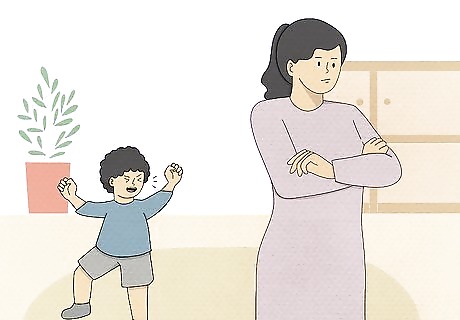
Ignore tantrums. Once a child realizes that acting up to get what they want doesn’t work, they will (eventually) stop. Ignoring their behavior is one way to show your child that their screaming will not work on you. Leave the room, pretend like you can’t hear them, and overall, don’t respond to their behaviors.
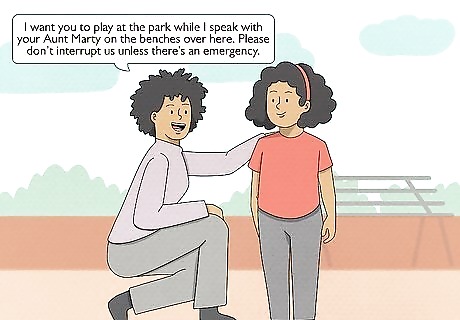
Teach them not to interrupt. Instruct your child not to interrupt when you’re in the middle of a task or you're speaking to somebody, whether in-person or on the phone. If you’re in the middle of something and your child has a question, tell them to wait patiently and you will answer them as soon as you can. Teach your child to say, “Excuse me” if they need to say something. Make your expectations clear. For example, say, “I want you to play at the park while I speak with your Aunt Marty on the benches over here. Please don’t interrupt us unless there’s an emergency.”
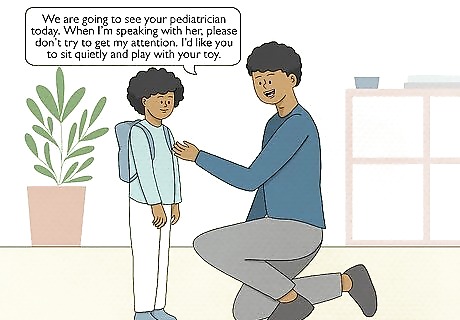
Tell your child when you will be busy. Your child may struggle to respect your boundaries when you’re in the middle of something. If your child tends to make bids for your attention while you’re busy, be clear that you are busy and cannot accommodate them. Tell your child ahead of time that you are doing something else and they are not to interrupt you. For example, say, “We are going to see your pediatrician today. When I’m speaking with her, please don’t try to get my attention. I’d like you to sit quietly and play with your toy.”

Reassure your child when they’re bored. Bratty behavior often emerges when your child is bored. Reassure your child that they can do things on their own, including picking an activity while they’re bored. Give some gentle encouragement to find or create a new activity. Say, “I bet a clever child like you can create beautiful artwork. Can you show me what you create when you’re done?”
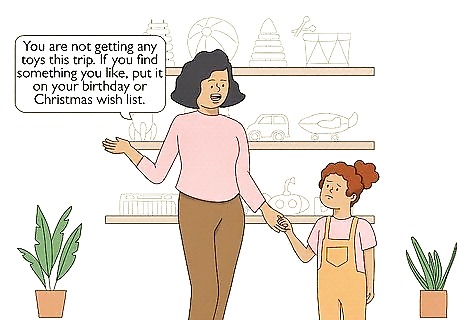
Prepare for difficult situations that might trigger your child. There may be specific situations that set your child off. Learn to anticipate their triggers and talk about their behavior beforehand. Let them know what you’ll be doing and what behaviors are not acceptable. For example, if you go to a toy store to pick out a gift, say, “You are not getting any toys this trip. If you find something you like, put it on your birthday or Christmas wish list.” You can also practice the difficult situations with your child so they get more comfortable with them. For example, if your child throws tantrums at the grocery store when they want you to buy them snacks, practice taking them to the grocery store and not buying them anything.
Enforcing Discipline

Enforce your rules consistently. Set limits for your child and don’t bend or sway on them. Be consistent in enforcing rules, even when you’re tired or busy. Your child will begin to see that you mean business and that you enforce the rules and limits you create. For example, if you tell your child that playing with balls inside the house will result with a timeout, put them immediately into timeout if you notice them throwing a ball around. Don’t listen to any justifications or excuses. If you have a set schedule, be consistent with it. Keeping your child on a consistent schedule can help manage their expectations.
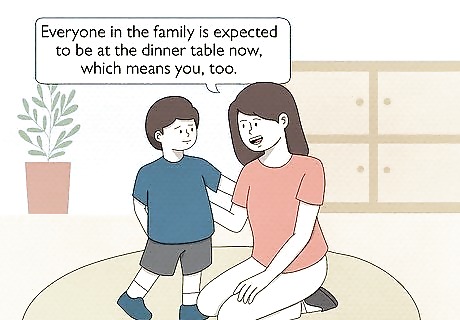
Shut down negotiations. Your child might start to negotiate with you in order to get something or perhaps even to bargain for power. When you say something to your child, mean it. Don't allow them to negotiate with you or everything may turn into a battle. For example, if you tell your child it’s dinner time and they ask for five more minutes of playtime, say, “Everyone in the family is expected to be at the dinner table now, which means you, too.” If you’ve already said no yet your child continues to push, say, “I’ve already said no. You know the answer stands and is not up for discussion.” If your child gets upset, let them be upset as long as they're following your rules.
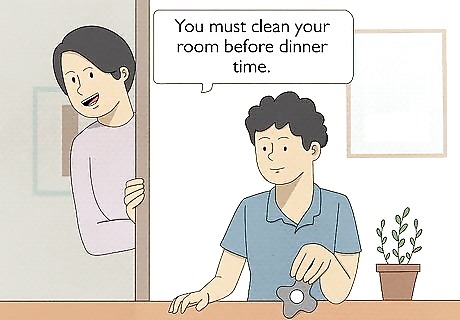
Avoid over-explaining yourself. If you find yourself explaining why your child should do something, they might start using this tactic back at you. Instead of explaining why they need to do something, just say what they need to do and ignore any discussions that come after. For example, if you say to your child, “Clean your room, otherwise you won’t be able to find things” just say, “You must clean your room before dinner time” and walk away. This will halt any responses such as, “But I can find my things just fine!”
Encouraging Positive Behaviors
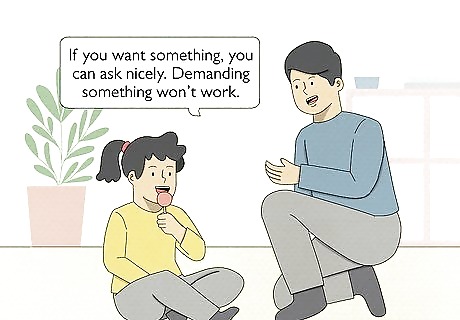
Explain to your child the correct way to interact. Avoid telling your child that they’re being a brat or acting bratty. Telling your child they are a brat doesn’t help them change their behaviors or know what specifically needs to change. Be specific about what behaviors you want your child to adjust without insulting them. For example, say, “If you want something, you can ask nicely. Demanding something won’t work.” You can also make an effort to model good behavior, too. Your children are always watching you, and will notice how you act and present yourself.
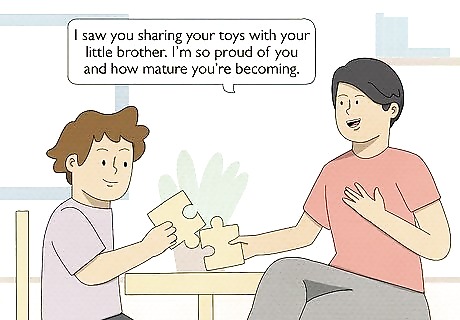
Reward positive behaviors. Bribing your child out of bad behaviors doesn’t stop them from misbehaving. Instead, focus more attention on when they behave well and reward that behavior. You may provide actual rewards (like dessert or more play time) or give them verbal praise. For example, say, “I saw you sharing your toys with your little brother. I’m so proud of you and how mature you’re becoming.”
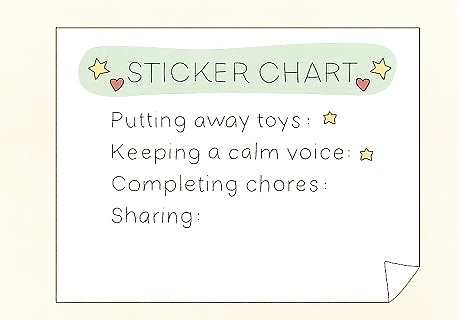
Give privileges only when they are earned. Put into place a reward system for your child so that they can earn privileges instead of automatically receiving them. Things like screen time, field trips, and playdates can be earned with good behaviors. For example, start a sticker chart with behaviors you want to see such as putting away toys, sharing, keeping a calm voice (not yelling) and completing chores. Each sticker can signify 15 minutes of television or another reward you determine.
Helping Your Child Connect with Feelings
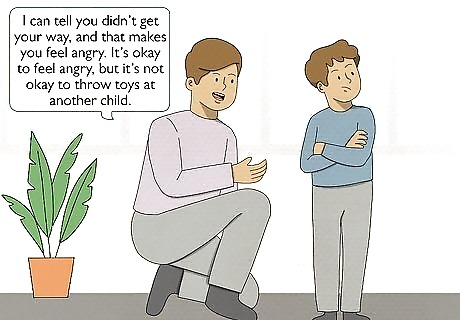
Validate their feelings, not their behaviors. If your child is hitting another child, tell them that it’s okay to be angry, but it’s not okay to hit. Children should learn that emotions are okay, but how they respond to how they feel is up to them, and you expect them to have good behavior. For example, say, “I can tell you didn’t get your way, and that makes you feel angry. It’s okay to feel angry, but it’s not okay to throw toys at another child.” Remember—children don't have the same tools that adults have to manage their emotions. Let your child experience the consequences of their bad behavior. For example, if they break one of their toys when they're upset, don't replace. This will teach them that their actions have consequences.

Teach your child to be grateful. Teach your children the value of saying “Thank you” and feeling grateful. Instead of whining or complaining, children can learn different ways to show their emotions, especially if they begin to act entitled. For example, teach your child to express gratitude if someone gives them something, even if it’s not the thing they wanted. For example, say, “I know you didn’t get the toy you wanted, but can you thank your Aunt and Uncle for thinking of you on your birthday and buying you a gift.”

Provide opportunities to build empathy. Being a brat often means the child is fixated on themselves and does not consider others. Children must recognize that other people have feelings and learn to consider other’s feelings, not just their own. Help your child build empathy by modeling empathy for them. Give them opportunities to practice empathy by volunteering, helping others, and talking about feelings. Talk about other people’s experiences and ask your child how other people might feel. When your child behaves badly toward another child, talk to your child about their behavior. For example, say, “How do you think Erica felt when you hit her? Do you think she wanted to be hit? Do you like it when people hit you? That’s right, it’s not fun. Please don’t hit.”

















Comments
0 comment